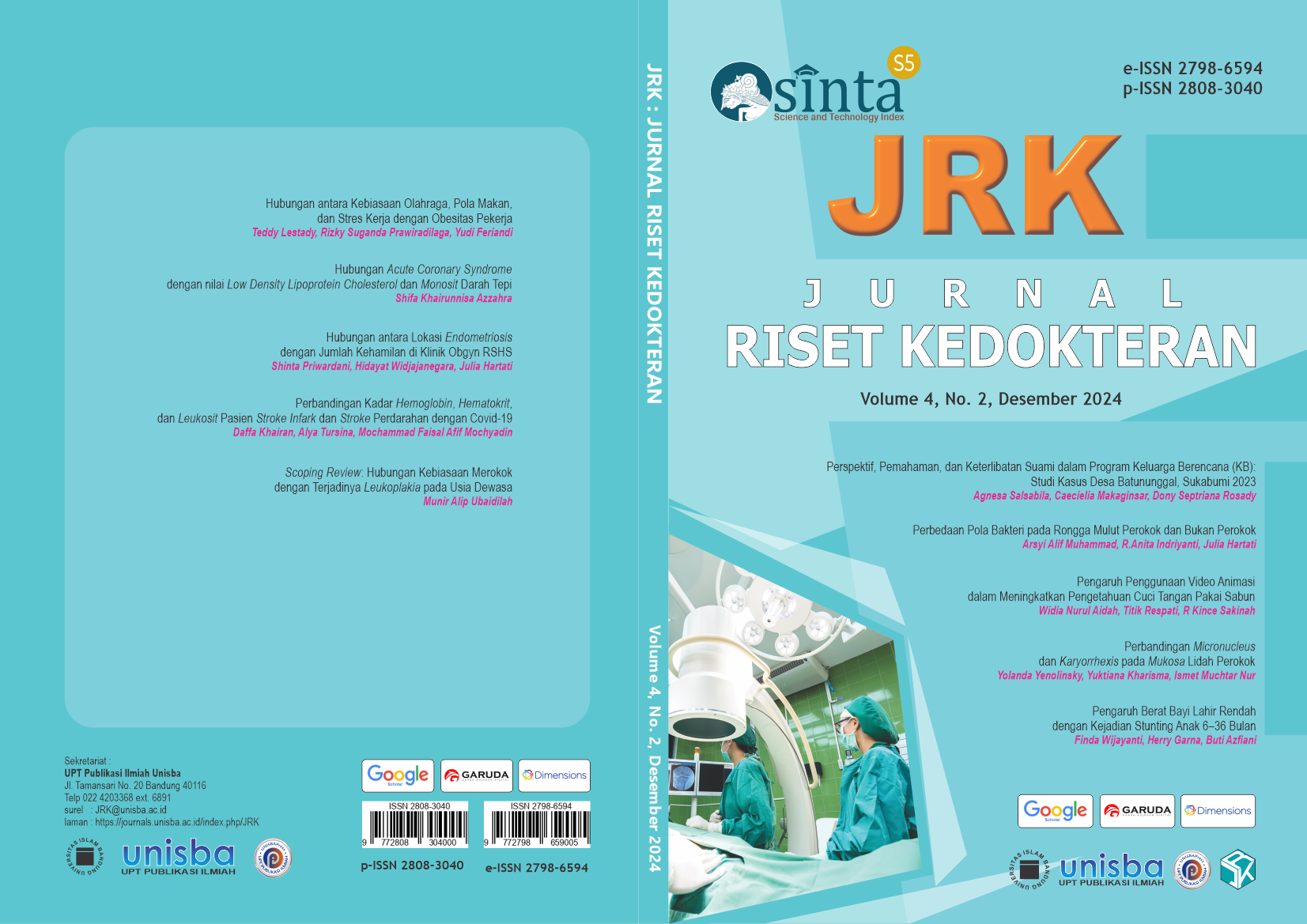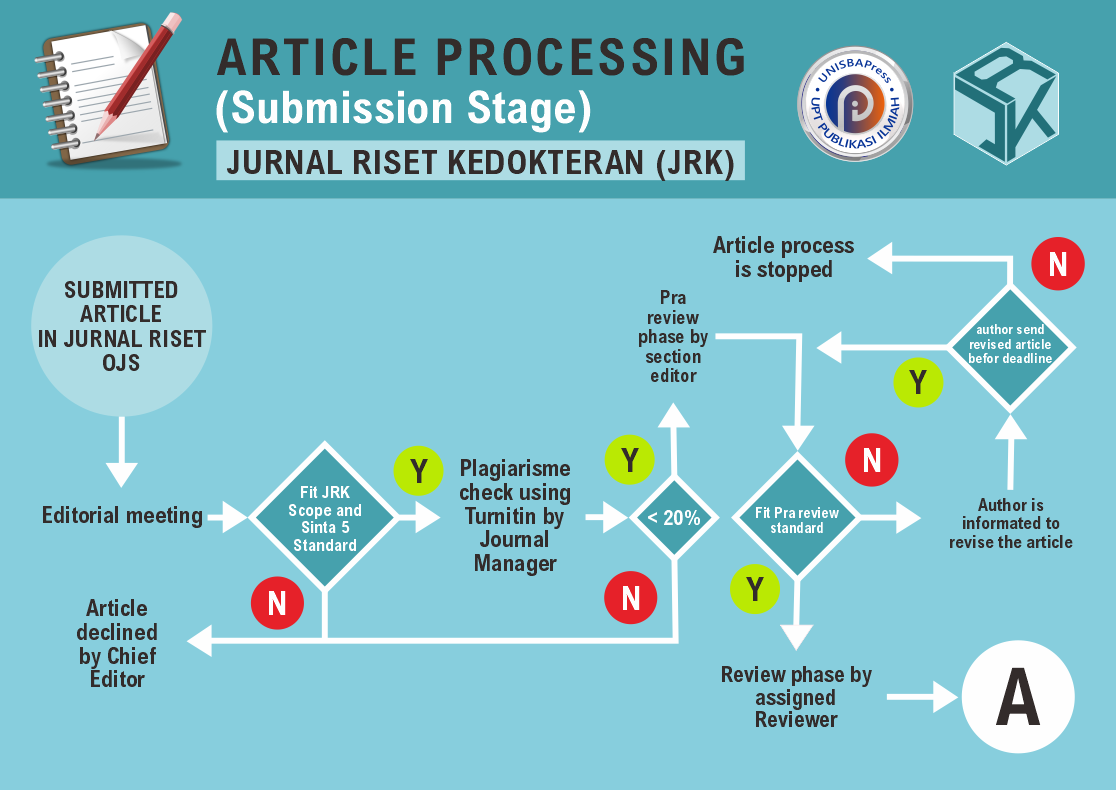Perspektif, Pemahaman, dan Keterlibatan Suami dalam Program Keluarga Berencana (KB): Studi Kasus Desa Batununggal, Sukabumi 2023
DOI:
https://doi.org/10.29313/jrk.v4i2.5005Keywords:
Program KB pada Pria, Persepsi, Pengetahuan, PartisipasiAbstract
Abstract. Rapid population increases the potential of social, economic and health problems, making it important to address the related challenges. The active involvement of men in family planning (FP) programs is very important to control population growth and improve the quality of family life. The aim of this research is to explore how men in Batununggal Village, Sukabumi view, understand, and participate in family planning programs. This research was conducted on all husbands in Batununggal Village, Sukabumi Regency totaling 60 respondents with a minimum of 55 sample using a descriptive method with a cross-sectional approach, data was collected via questionnaire and analyzed using SPSS version 25.0 for accuracy of results. The results show that the majority of respondents have a negative view of male family planning (81.7%), the majority (48.3%) understand quite well about it, but participation remains low (25%). Factors such as religion, patriarchal culture, gender, costs, and social impacts influence men's participation in family planning. Their negative perception of family planning programs is a key factor that hinders their participation. Therefore, more efforts are needed to increase men's understanding and knowledge about family planning, which is expected to encourage more active participation in this program.
Abstrak. Peningkatan populasi yang cepat berpotensi menimbulkan masalah sosial, ekonomi, dan kesehatan yang serius, sehingga penting untuk mengatasi tantangan yang terkait. Keterlibatan aktif pria dalam program keluarga berencana (KB) sangat penting untuk mengendalikan pertumbuhan populasi dan meningkatkan kualitas hidup keluarga. Tujuan dari penelitian ini adalah untuk mengeksplorasi bagaimana pria di Desa Batununggal, Sukabumi memahami, mengetahui, dan berpartisipasi dalam program KB. Penelitian ini dilakukan kepada seluruh suami yang berada di Desa Batununggal, Kabupaten Sukabumi sebanyak 60 responden dengan minimal 55 sampel, menggunakan metode deskriptif dengan pendekatan cross-sectional, data dikumpulkan melalui kuesioner dan dianalisis menggunakan SPSS versi 25.0 untuk keakuratan hasil. Hasilnya menunjukkan mayoritas responden memiliki pandangan negatif terhadap KB pria (81,7%), meskipun sebagian besar (48,3%) cukup mengerti tentangnya, namun partisipasi suami tetap rendah (25%). Faktor-faktor seperti agama, budaya patriarki, gender, biaya, dan dampak sosial mempengaruhi partisipasi pria dalam KB. Persepsi negatif mereka terhadap program KB merupakan faktor kunci yang menghambat partisipasi mereka. Oleh karena itu, perlu upaya lebih untuk meningkatkan pemahaman dan pengetahuan pria tentang keluarga berencana, yang diharapkan dapat mendorong partisipasi lebih aktif dalam program ini.
References
Andhika MA. Perencanaan Dinas Pengendalian Penduduk dan Keluarga Berencana dalam Melaksanakan program Kampung KB Provinsi Sumatra Selatan. Repository Institut Pemerintahan Dalam Negeri. 2022: 1-13.
Badan Kependudukan dan Keluarga Berencana Nasional. Rencana Strategis BKKBN 2020-2024. BKKBN, 2020: 1-73.
Dewi TK, Purwono J, Ludiana. Determinan Persepsi Suami Tentang Penggunaan alat Kontrasepsi Analisis SKDI 2017. Jur Wac Kesehatan. 2021; 6 (1): 15-2.
Darmawan DP, Lestari I, Desi, CPL. Persepsi Suami Tentang Alat Kontrasepsi Pria di Klurahan Wates Kota Mojokerto. Repository STIKes Bina Sehat PPNI Mojekerto. 2021: 1-5..
Vidayanti LA. Hubungan Persepsi dan Dukungan Keluarga dengan Pemilihan Metode KB MOP. Jur Il Il Keperawatan. 2019; 10 (2): 1-6.
Mafazat I, Prijatni I, Umami R. Hubungan Pengetahuan Suami dengan Pemilihan Metode Kontrasepsi Vasektomi. Jur Keb Sorong. 2022; 2 (2): 52- 60
Binsaleh S, Sait M, Aljarbou A, Almannie R. Knowledge, attitudes, and perception patterns of contraception methods: Cross-sectional study among Saudi males. Urology Annals. 2021;13(3):243.
Tumwesigye R, Eustes Kigongo, Nakiganga S, Godfred Mbyariyehe, Nabeshya J, Amir Kabunga, et al. Uptake and Associated Factors of Male Contraceptive Method Use: A Community-Based Cross-Sectional Study in Northern Uganda. Open Access Journal of Contraception. 2023 Jul 1;Volume 14:129–37.
Takyi A, Sato M, Adjabeng M, Smith C. Factors that influence modern contraceptive use among women aged 35 to 49 years and their male partners in Gomoa West District, Ghana: a qualitative study. Tropical Medicine and Health. 2023 Aug 3;51(1)
Walker S. Attitudes to a male contraceptive pill in a group of contraceptive users in the UK. Journal of Men’s Health. 2011 Dec;8(4):267–73
Khamishon R, Chen J, Ranatunge N, Wu Q, Downey N, Love E, et al. Use and Perception of Contraception among Genders in Santo Domingo, Dominican Republic. Annals of Global Health. 2019;85(1)
Kriel Y, Milford C, Cordero J, Suleman F, Beksinska M, Steyn P, et al. Male partner influence on family planning and contraceptive use: perspectives from community members and healthcare providers in KwaZulu-Natal, South Africa. Reproductive Health. 2019 Jun 25;16(1)













